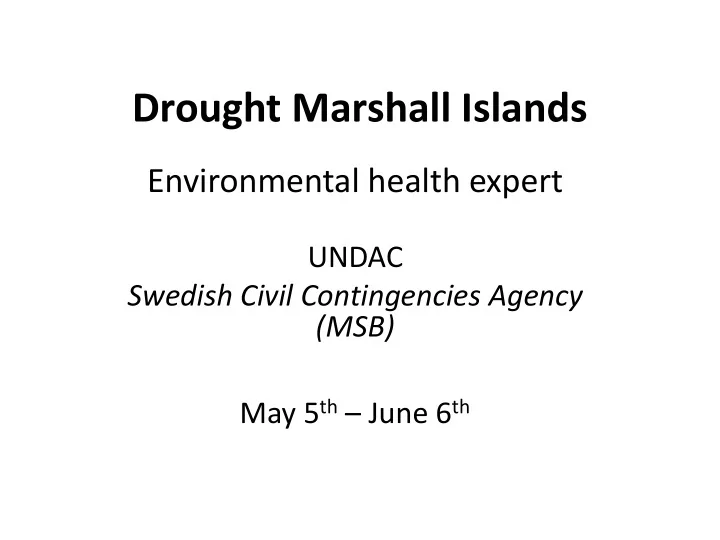

Drought Marshall Islands Environmental health expert UNDAC Swedish Civil Contingencies Agency (MSB) May 5 th – June 6 th
Republic of Marshall Islands • ~ 54.500 people • Nearly 1 million square miles (~ Europe) • 180 square km landarea
29 atolls and 5 islands…
…with in total 1200 islands, islets and atolls
Drought… • Prolonged dry season with hardly no rain since several months • RMI declared a state of emergency 19 april 2013 for Northern atolls • 6.384 people live in the affected area
Response upon arrival UNDAC • National Disaster Committee, including chief secretary • Emergency Operation Center, EOC • Assessments on affected islands, ex. - tanks and gutters available at households - type of tanks - remaining water in tanks (half or full?) - salinity in wells (safe or unsafe?)
UNDAC support • Structure for information management and EOC center • Formation of cluster approach (health, WASH, food and logistics) • 3W (who, what, where)
EOC
Environment Health expert? Water for drinking, hygiene and cooking? - Rain water catchments - Well water (thin resource of freshwater) - Reverse osmosis units - Other islands or coconuts?
Drought impact • Household water catchments are almost more or less empty • Salinity level of water from wells has rise to unsafe levels • Declining water production from reverse osmosis units present at the islands • Impacts on agriculture and food supply
Environment Health expert • Response plan for WASH cluster (and overlaps with other clusters) • Overall support to WASH cluster (MWSC, UNDAC, IFRC, NZ RC, USAID, IOM) as overview per islands, gathering info from actors, identify gaps etc. • Visit at Wotje and Wodmej for installing RO unit and household visits
Response plan – WASH cluster (immediate and midterm response) • 2 g/p/d • Distribution of bottle water • Deployment of RO units (350 g/d, from USAID, IFRC, NZ RC) and maintenance • Provision of WASH kits and hygiene promotion • Increase of water catchments and tanks • Improve rainwater catchments systems and awareness of maintenance
Wotje atoll • Most populated atoll with 859-1078 people (sometimes students)
Old RO unit out of order
Installation of new RO unit
Household visits Wodmej and Wotje
Water supply (d/h/c), hygiene, toilets?
Urgent need for drinking water • Tanks more or less empty • Drinking water from very salty wells (Wotje) • No fuel to fetch water at Wotje (Wodmej) • Hygiene, cooking from well
Health problems (stomach and skin problems)
Water catchments needs to be improved
Water flushed toilet and latrin - many without soap
Lessons learned • Adapt to local context • Built capacity and preparedness • Long term solutions, climate change? • Built awareness to reach the most poor and vulnerable first
Recommend
More recommend